
Liberation is an album by the Jamaican musician Bunny Wailer, released in 1989 through Shanachie Records. Wailer supported the album with a North American tour. It was nominated for a Grammy Award, in the "Best Reggae Recording" category.

Eddie Palmieri is an American Grammy Award-winning pianist, bandleader, musician, and composer of Puerto Rican ancestry. He is the founder of the bands La Perfecta, La Perfecta II, and Harlem River Drive.

Giovanni Hidalgo a.k.a. "Mañenguito" is a Latin jazz percussionist.
A descarga is an improvised jam session consisting of variations on Cuban music themes, primarily son montuno, but also guajira, bolero, guaracha and rumba. The genre is strongly influenced by jazz and it was developed in Havana during the 1950s. Important figures in the emergence of the genre were Cachao, Julio Gutiérrez, Bebo Valdés, Peruchín and Niño Rivera in Cuba, and Tito Puente, Machito and Mario Bauzá in New York. Originally, descargas were promoted by record companies such as Panart, Maype and Gema under the label Cuban jam sessions. From the 1960s, the descarga format was usually adapted by large salsa ensembles, most notably the Fania All-Stars.
Brian Lynch is an American jazz trumpeter. He has been a member of Eddie Palmieri's Afro-Caribbean Jazz group and has led the Latin Side of Miles project with trombonist Conrad Herwig.
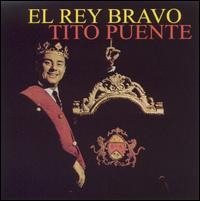
"Oye Cómo Va" is a 1962 cha-cha-chá by Tito Puente, originally released on El Rey Bravo. The song achieved worldwide popularity in 1970, when it was recorded by American rock group Santana for their album Abraxas. This version was released as a single in 1971, reaching number 13 on the Billboard Hot 100, number 11 on the Billboard Easy Listening survey, and number 32 on the R&B chart. The block chord ostinato pattern that repeats throughout the song was most likely borrowed by Puente from Cachao's 1957 mambo "Chanchullo", which was recorded by Puente in 1959.
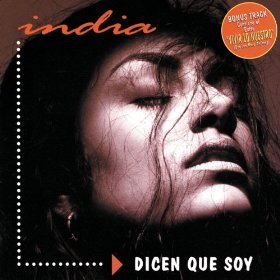
Dicen Que Soy is the third studio album by Puerto Rican recording artist La India released on September 20, 1994, by RMM Records. The album was produced by American musician Sergio George, who chose the songs for India to record with an emphasis on feminism to suit with her voice. The production mixes salsa music with other rhythms such as funk and timba. Five singles were released from the record with "Nunca Voy a Olvidarte" and "Ese Hombre" topping the Billboard Tropical Songs chart.

Dreams Beyond Control is the seventeenth album by the American jazz group Spyro Gyra, released in 1993 by GRP Records. The group supported the album with a North American tour.

Angelus is an album by the Brazilian musician Milton Nascimento, released in 1994.

Ernest AnthonyPuente Jr., commonly known as TitoPuente, was an American musician, songwriter, bandleader, timbalero, and record producer. He composed dance-oriented mambo and Latin jazz music.

Dafnis Prieto is a Cuban-American drummer, composer, bandleader, and educator.
Vitín Avilés was a Puerto Rican singer, Born in the Barrio San Silvestre of Mayagüez. He learned from his father the Barber job, while he was singing his first gigs in amateur radio shows. In 1943 started as a lead singer on the Orquesta Hatuey of William Manzano and with the Orquesta Anacaona. In 1944 he went to San Juan, Puerto Rico, to sing with the Orquesta of Miguelito Miranda on where he recorded his first album. who in the 1940s and 1950s often went unnoticed, even though he was among Latin music's five most popular band singers during the period. He sang in Tito Puente's orchestra and was lead vocals on the hit single Ran Kan Kan. He also sang with Tito Rodríguez, Carlos Varela (bandleader), with his own orchestra, and for Charlie Palmieri. He died January 1, 2004, at St. Vincent's Hospital, in Manhattan, New York.
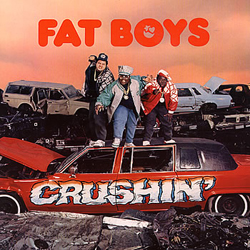
Crushin' is the fourth studio album by the hip hop group the Fat Boys, released in 1987. It was their breakout album, charting in the top 10 on both Billboard Pop and R&B album charts and selling more than a million copies by the end of the year. It includes a cover version of the Surfaris' hit "Wipe Out" with the Beach Boys singing back-up vocals. The cover made it to No. 12 on the Billboard chart, and No. 10 on the corresponding R&B listing. The album peaked at No. 49 on the UK Albums Chart.

Superimposition is the twelfth studio album by American pianist Eddie Palmieri. It was released by Tico Records in 1970. The album combines modern salsa renditions of Cuban standards on side A with experimental descargas on side B. Since its release, the album has been praised by critics such as John Storm Roberts for its innovative approach.

El Sonido Nuevo, subtitled/translated The New Soul Sound, is an album by Latin jazz vibraphonist Cal Tjader and pianist Eddie Palmieri recorded in 1966 and released on the Verve label.

Voodoo is an album by the New Orleans brass band the Dirty Dozen Brass Band, released in 1989. It was the band's Columbia Records debut.

Tings an' Times is an album by the Jamaican dub poet Linton Kwesi Johnson, released in 1991. It was Johnson's first album in six years. Tings an' Times also served as the title of a book of Johnson's poetry.

Kicking Cans is an album by the Brazilian musician Dori Caymmi, released in 1993. "Brasil ", featuring Herbie Hancock, was nominated for a Grammy Award for "Best Jazz Instrumental Solo".
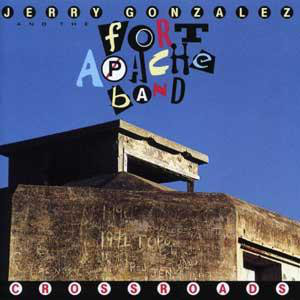
Crossroads is an album by the American musician Jerry González, released in 1994. He is credited with his Fort Apache Band. The album was nominated for a Grammy Award for "Best Latin Jazz Performance".
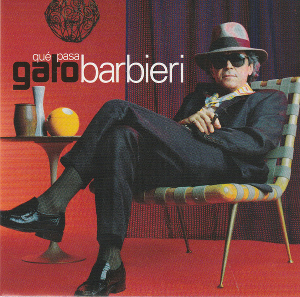
Qué Pasa is an album by the Argentine musician Gato Barbieri, released in 1997. It was his first studio album in more than a decade. Barbieri supported it with a North American tour. The album was a hit on Billboard's Contemporary Jazz Album chart.
















